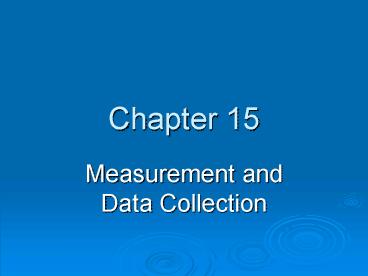Measurement and Data Collection - PowerPoint PPT Presentation
1 / 12
Title:
Measurement and Data Collection
Description:
Reliability - the consistency of an instrument in measuring what it is designed ... Educational Testing Service (ETS) Test Collection Catalog (Oryx Press) ... – PowerPoint PPT presentation
Number of Views:28
Avg rating:3.0/5.0
Title: Measurement and Data Collection
1
Chapter 15
- Measurement and Data Collection
2
Measurement Scales
- Nominal
- Ordinal
- Interval
- Ratio
3
Reliability
- Reliability - the consistency of an instrument in
measuring what it is designed to measure
(similarity of results over time) - Reliability Coefficient - a numerical indicator
of the consistency of a measurement instrument
(from 0.00 to 1.00)
4
Reliability Measures
- Parallel (Alternative Forms)
- Test-Retest
- Split-Halves
- Kuder-Richardson
- Cronbach Alpha
- Inter-rater
- require only one administration of instrument
5
Validity
- the extent to which an instrument measures what
it is designed to measure (internal validity) - Content-related evidence
- Criterion-related evidence
- concurrent
- predictive
- Construct-related evidence
6
Commercial Instruments
- eliminate need to develop own instrument
- require little/no pilot testing (if used with
appropriate population - have available reliability/validity statistics
- overall - reduces effort in preparing for data
collection - But more expensive and must be appropriate for
the purpose of the study
7
Types of Instruments
- Achievement tests
- Attitude measures
- Aptitude tests
- Personality measurements
- Rating scales
- Observation systems
8
Holistic Scoring
- Dependent variable - qualitative in nature (e.g.
overall quality of an essay) - holistic - scores the response as a whole, rather
than in parts - focuses on global quality
- subjective
- often ordinal - places responses in one of
several ordered categories
9
Holistic Scoring
- Summarize the qualitative aspects desired in the
response (a model response) - Score responses anonymously and in random order
- Have two/more equally competent scorers score
responses independently - Use a third scorer to resolve discrepancies in
the scores of two scorers - Score all responses to one item before beginning
the next item - Make scorers aware of irrelevant factors that
might affect scoring - Be aware of factors such as fatigue and boredom
10
Where to Find Test Information
- Buros Tests in Print III
- Buros Tenth Mental Measurement Yearbook
- Index to Tests Used in Educational Dissertations
(Fabiano, 1989) - Educational Testing Service (ETS) Test Collection
Catalog (Oryx Press) - Volume 1 - Achievement Tests and Measurement
Devices - Volume 2 - Vocational Tests and Measurement
Devices - Volume 3 - Tests for Special Populations
- Mirrors for Behavior (Simon Boyer, 1974)
- Test Publishers
- Measurement Journals
11
Ethical Legal Considerations
- protect participants' dignity and welfare
- prevent undue intrusion of privacy
- maintain ethical standards of coworkers/assistants
- inform participants of the purpose of the
research - inform participants of their role in the project
- inform participants of the research results
(optional)
12
Procedures (Fowler, 1984)
- Gather written confidentiality of all having
access to data (who can identify respondents) - Minimize links between identifiers and answers
- Prevent access to completed instruments by
nonproject members - Remove identifiers before showing to nonproject
members - Do not show data to those able to identify
respondents by their demographic profiles - Do not allow general users of the data file to
link identifiers and responses - During analysis, present data for small
categories of respondents very carefully - The researcher is responsible for the storage or
eventual destruction of instruments when the
research project is completed

